West Helena Blues
West Helena Blues
Located across the Mississippi from Clarksdale, Helena, Arkansas was a thriving wide-open port town during the’30s and ‘40s. The main street Cherry, which paralleled to levee, had dozens of white saloons, while Elm Street, running just behind, had dozens of black. Bluesmen from all over – Johnny Shines, Robert Johnson, Howlin Wolf, Sunnyland Slim and Rossevelt Sykes – congregated here by the dozens, knowing they could get work. Memphis Minnie sang about “Rechin’ Pete” an unpopular policeman who patrolled Cherry Street. Roosevelt Sykes wrote a song called “West Helena Blues”.
West Helena Blues
Bluesman Cedell Davis, who was born in Helena in 1926, remembered the old days in a 1976 interview: “They could go to town and stay ‘till maybe 9 or 12 o’clock [in Mississippi towns], they’d get out, you see. But now, Helena, you didn’t have to worry about no time, all day, you know what I mean like that. Well, anything that you wanted to spend money on or buy, it was there. All you had to do was look around, it was there.”
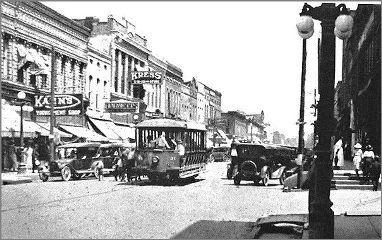
Cherry Street, Helena 1920
Roosevelt Sykes was born on January 31, 1906, in Elmar, Arkansas, a community he later described as “just a little sawmill town.” In 1909, Sykes moved with his family to St. Louis, Missouri. He often returned to his grandfather's farm near West Helena and played the organ in a local church. By 1918 he had taught himself the art of blues piano and, three years later, left home to work as an itinerant pianist in gambling establishments and barrelhouses throughout Louisiana and Mississippi. He led the life of a rambler, playing music in order to survive.
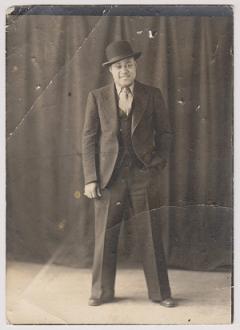
Roosevelt Sykes, 1930
While in St. Louis, Sykes performed as a soloist and occasionally played with other musicians like guitarist Big Joe Williams. However, his most important mentor was “Pork Chop” Lee Green, who taught Sykes a rendition of the “Forty-Four Blues” piano style.
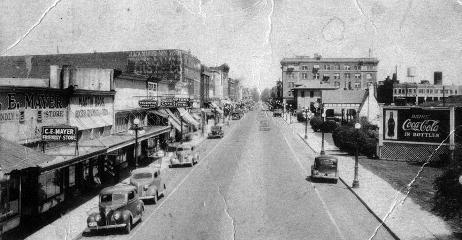
Helena Downtown, 1930
In 1929 Sykes met Jesse Johnson, the owner of the Deluxe Record Shop in St. Louis. Sykes, who at the time performed at an East St. Louis club for one dollar a night, quickly accepted Johnson's invitation to a recording session in New York. Accompanied by Johnson, Sykes arrived at the Okeh Studios in New York in June of 1929. He recorded several numbers, including a version of “Forty- Four Blues” which featured vocals based on the theme of a .44 pistol. During the same year, while attending a recording session for Paramount, Sykes received the nickname “The Honey Dripper” from a song written by singer Edith Johnson.
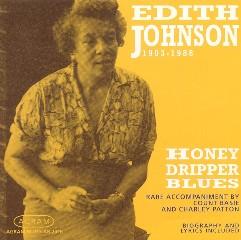
Edith Johnson
In the early 1930s, Sykes moved to Chicago. During the depression years, he recorded for several labels under various pseudonyms. Sykes settled in Chicago in 1941 and, within a short time, became a house musician for the Victor/Bluebird label. Though the label marketed him to be the successor for Fats Waller (who recorded on the same label and died in 1943), Sykes found success as the creator of his own style and remained active as a session man, recording with such musicians as Robert Brown a. k. a. Washboard Sam.
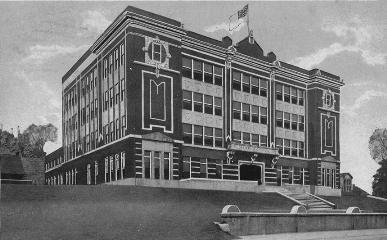
Helena High School, 1929
In 1943, while in Chicago, Sykes formed his own group, the Honeydrippers, which often numbered twelve musicians, and within its ranks many of the city’s finest horn players. Traveling with his group, Sykes played venues like the Palace Theater in Memphis. In performing with a larger ensemble, Sykes worked to conform his loose solo-oriented piano style to formal chord sequences. He recalled, in Beale Black & Blue, how he “took up harmony, by having me a band. I had to tell the fellows what I wanted them to do.… But I didn’t play what I told them, see,’cause I never could play anything over again just alike.”
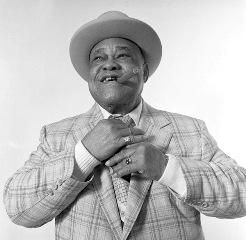
Roosevelt Sykes
In the post World War II years, Sykes recorded on several labels. In the liner notes to Ann Arbor Blues & Jazz Festival 1973, John Sinclair noted: “The music of Roosevelt Sykes, so timelessly buoyant, so fresh and personal at times, transcended every vagary of the marketplace and lived a vibrant life of its own, no matter what current fads of stylistic alterations held sway, all through the turbulent years between 1929 and 1949.”
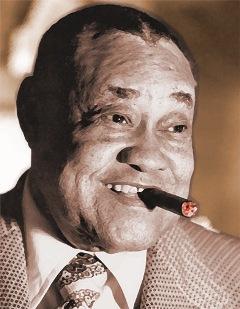
Roosevelt Sykes
Sykes moved to New Orleans in 1954 and, despite the wane in the popularity of blues by the mid 1950s, continued to play in small clubs around the Crescent City. After returning to St. Louis in 1958, he moved to Chicago in 1960, where he was “rediscovered” by enthusiasts of the folk music revival. In 1961 Sykes toured Europe and appeared in the Belgian film ‘Roosevelt Sykes the Honeydripper’. In 1965 and 1966, he toured with the American Folk Blues Festival. While in Europe in 1966, he cut the album ‘Roosevelt Sykes, Gold Mine’ for Delmark. During the decade he also recorded for specialty labels such as Bluesville, Storyville, and Folkways.
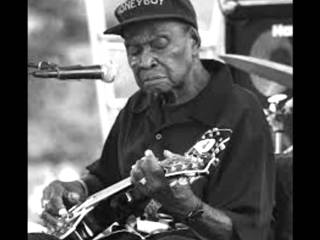
Honeyboy Edwards plays West Helena Woman
In 1972 Sykes appeared in the French film ‘Blues under the Skin’ and in September 1973 made a triumphant return to the Ann Arbor Blues & Jazz Festival, a set captured on the LP ‘Ann Arbor Blues & Jazz Festival, Volume 3’. That same year, Delmark released Sykes’s album ‘Feel Like Blowing My Horn’, featuring such Chicago-based bluesmen as guitarist Robert Lockwood, Jr. and drummer Fred Below.
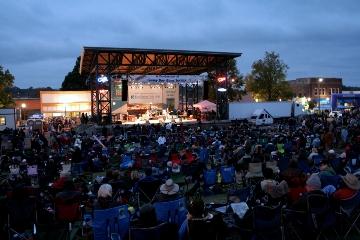
Helena - King Biscuit Blues Festival, 2013
Sykes worked festivals and concert dates until his death of a heart attack on July 17, 1984, in New Orleans. A man who lived life by his musical talent and ability to communicate with people of all walks of life, Sykes, in ‘Beale Black & Blue,’ cited the real inspiration behind his musical talent. “Blues is a talent you’re born with from God. He gave me the gift,” explained Sykes. “I didn’t even take a lesson in my life.”
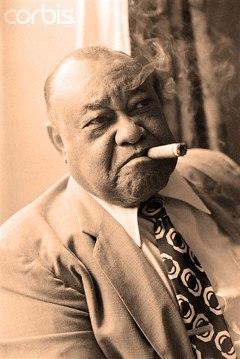
Roosevelt Sykes
Henry Townsend wrote in his book ‘A Blues Life’: “While I was down in Helena one time, I met Red Eyed Jesse Bell. He also played piano. Roosevelt always referred to him; he’d play a number and he’d always refer to it as ‘Red Eyed Jesse Bell played this.’ I think Roosevelt got ‘West Helena Blues’ from Jesse Bell, either him or his baby brother Walter Sykes. Walter Sykes was a genius at his songs and this is one of the things that caused Roosevelt and I to get together. He got a little jealous of his brothers, Jesse and Walter, and he kind of hired me away from them.”
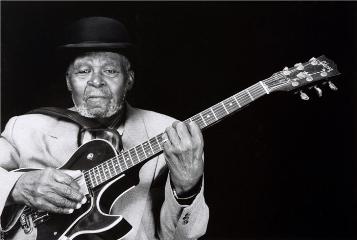
Henry Townsend
Downtown Helena retains its blues-soaked quality, probably more than anywhere else. The buildings, the river, the levee, the people, the festival, and the radio programs all cast a spell that make it easy to dream you’re back to 1929. Unfortunately it is also desperately poor and seems to be crumbling almost as you watch. Restoring the old buildings seems an insurmountable task, although the Delta Cultural Center and Main Street Helena do what they can. But who knows ?
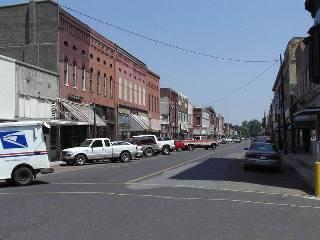
Cherry Street today
West Helena Blues, lyrics by James Cotton
I got a woman I'm lovin', lives in West Helena Arkansas She buys me them long toed shoes, keeps that brown mule up in my jaw She gets paid up on a Friday, Saturday night we go out and have ourselves a ball Out of all the women I've got, I love that woman from Arkansas the best of all You know they say West Helena ain't nothin' but a murderer's home Well I don't care for the graveyard, people, maybe that's where I'll be before long
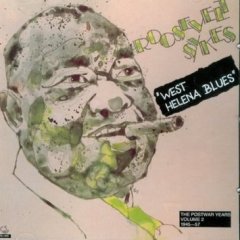
Roosevelt Sykes - West Helena Blues








